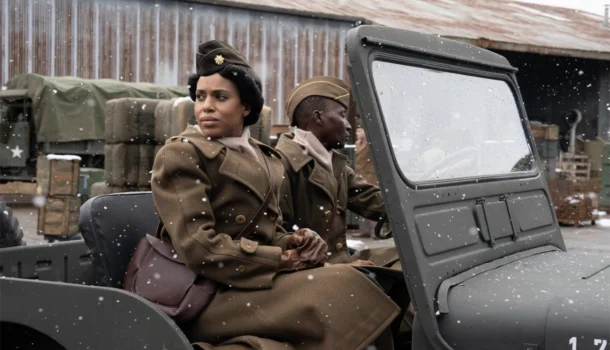Tyler Perry may no longer need to prove anything to anyone, though his name still sparks mixed reactions. For some, he’s a purveyor of easy formulas; for others, a creative force who defies convention and rewrites paths. Regardless, one fact is undeniable: his versatility not only endures but evolves — and with “Six Triple Eight,” Perry takes a rare risk by repositioning himself as a chronicler of the buried chapters of American history. In this drama, the setting isn’t just World War II, but the minefield of forgotten narratives, where Black women claim space not through the rhetoric of glory, but by enduring the daily toll of invisibility.
The gamble here is not on the epic grandeur of battle, but on the quiet resistance against a system that, even during a time of global crisis, continued to rank lives in a hierarchy. The film delves into a specific chapter in the struggle for dignity: the formation of the 6888th Central Postal Directory Battalion, made up entirely of Black women and led by Major Charity Adams Earley. Rather than combat scenes, what unfolds are stacks of letters — a symbolic battleground, where backlogged mail threatens to sever the fragile thread linking soldiers to home. It’s in this terrain that Perry and co-writer Kevin Hymel fix their lens: on the logistics of care as a wartime strategy.
Kerry Washington finds in Charity a role that demands more than strength: it calls for restraint, tactical intelligence, and a conviction that never tips into hysteria. She threads nuance with precision, embodying a leadership defined not by volume, but by ethical gravity. Her performance echoes the dignity of figures like Dorothy Vaughan or Katherine Johnson, yet with a different urgency — that of a woman leading not just a unit, but an idea: that efficiency owes nothing to gender or race, and everything to access.
What makes the film most compelling, however, isn’t just the journey of its protagonists, but the way it navigates contradictions. Figures like Eleanor Roosevelt and Mary McLeod Bethune, portrayed by Susan Sarandon and Oprah Winfrey, expand the political breadth of the story, yet the focus remains on everyday frictions: uniforms that don’t fit Black bodies, the mistrustful stares of white officers, the telegrams that monitor more than they inform. These subtle details shape the film’s deeper dramatic texture.
Among the officers, the interplay between Charity and her peers stands out — especially Lena Derriecott King, whose composed indignation contrasts with the biting sarcasm of Johnnie Mae, played with impeccable comedic timing by Shanice Williams. This balance of restraint and rebellion underscores a recurring theme in stories of exclusion: you must be twice as good and still smile through it. Humor here doesn’t diffuse the tension; it sharpens it.
Perry’s decision to center a narrative in which heroism stems not from physical combat but from discipline and collective unity upends expectations and demands a fresh view of what it means to “serve the nation.” There’s no room for fiery rhetoric or hollow aesthetics — what unfolds is the harsh reality of service performed by those never called to the frontlines, yet whose efforts sustained the emotional lifeline of those who were.
“Six Triple Eight” functions not as spectacle, but as reparation. It doesn’t offer a storyline of easy triumphs, but a portrait of a group that couldn’t afford to fail — not out of patriotic zeal, but for political survival. By bringing this episode to light, Perry steps away from any comfort zone and shows that, under his authorship, room still remains for genuine surprise.
The film doesn’t aim to create martyrs or iconic heroines; it chooses instead to portray women who, though constrained by military structure, carved out slivers of space to write their own history. And it is precisely in that decision — to recognize rather than romanticize — that the film finds its most lasting strength. It’s not about remembering to glorify, but to understand that memory, when rightly told, can also be an act of justice.
Film: The Six Triple Eight
Director: Tyler Perry
Year: 2024
Genres: Drama/War
Rating: 8/10

